BABY DEVELOPMENT

Stages of Baby Development which highlights important landmarks of Baby Development and the milestones of Baby Development including when baby should start crawling, walking and talking
Each baby develops in a unique way and there is a wide variety among individual babies as to when certain milestones are reached.
The following are just guidelines about what you can expect from your baby at each stage.
It is better not to focus on early developmental milestones as indicators of aptitude. Development is frequently on a par with other babies by the time a baby reaches 2 years old.
In other words, just because your baby walks at 9 months it does not mean that he is going to be an olympic star!
Milestones can be useful to help you be aware of certain early warning signs of developmental problems, such as lack of eye contact, stiffness and severe language delay. Watching your baby's development helps you to realise what your baby can do and how to stimulate him.The most important thing is to enjoy your baby and to provide abundant love and caresses..
NEWBORN
-
The first two weeks are a time of real adjustment. Hormonal changes and the lack of sleep can play havoc with the new Mum, and the sudden realisation of having a tiny, helpless infant to care for, can make this a time of anxiety and stress. Most new mums expect to be overcome with vast feelings of love and immediate bonding, but the challenges of breastfeeding added to lack of sleep, often result in the "baby blues". This is normal, and things soon settle down. If depression persists, see a doctor. You are not alone!!!
-
For your newborn baby , the adjustment is to a new, sensory-filled world where everything is different from his experience in the womb. The newborn baby must now start learning how to interpret the world as well as how to block out unwanted stimulation.
-
Newborn babies need a lot of sleep should be settled down to sleep after 40 to 60 minutes of awake time. For the first two weeks your baby naturally blocks out much of the stimulation by simply shutting down and sleeping. He may spend most of every day asleep, waking only for feeds. This is normal and within three weeks will find baby more alert and frequently fussier.
1 MONTH
Most babies should be able to . . .
- Stare and focus at faces
- Lift head briefly when on stomach
- espond to sound
- Blink at bright lights
Some babies will probably be able to . . .
-
Turn towards familiar voices and sounds
-
Follow objects moved about 6 to 10 inches from face
-
Look and see black and white patterns
Some babies could possibly be able to . . .
-
Smile in response to your smile
-
Laugh
-
Hold up head at 45 degree angle
-
Hold head steady when upright
|
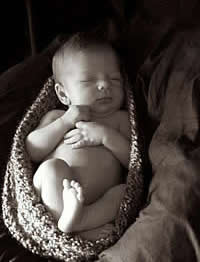 |
6 TO 12 WEEKS
Baby’s first smile often occurs during this period. Baby begins to delight in social contact.. If your baby suffers from ‘colic’ or extended periods of crying, this should begin to settle at this stage. Moms can start extending " awake time" to 80 minutes during the day giving Mom more time to play with and stimulate baby's development. Understand, however, that overstimulation and tiredness contribute to fussing, so make sure that stimulation times are balanced with calming activities such as cuddiing and crooning to baby. Baby will probably naturally start to last for one longer period between feeds at night. The early morning feed is usually the last to fall away, so broken sleep is still a factor.
- Reaching out for toys starts at this stage and you can help to develop this skill by hanging mobiles within easy reach.
- Putting baby on his tummy helps to strengthen the neck muscles which will be important for crawling later on.
- When your baby starts to coo, respond by imitating the sound so your baby learns about social conversations.
2 MONTHS
Most babies should be able to . . .
- Smile in response to your smile
- Follow objects with eyes
- Make noises other than crying
Some babies will probably be able to . . .
- Hold up head at 45 degree angle while on stomach
- Make smoother movements
- Smile and laugh in response to you
- Hold head steady when upright
Some babies could possibly be able to . . .
- Reach for an object
- Raise chest and head while on stomach
- Roll over one way
- Bring both hands together
- Bear weight on legs
3 TO 6 MONTHS
Baby seeks interaction and can now manage an hour and a half of awake time between sleeps, during the day. During this time he should be alert and happy and enjoying social contact. Baby is still learning how to assimilate the stimulation his world offers, so watch for signs of overstimulation and place him in a calm environment before he becomes over excited. It is important to develop good sleep habits and a full night’s sleep can be now be expected, especially if your baby is a good sleeper. Milk continues to be the no1 priority for nutrition at this stage. Some babies need to have solids introduced as they approach 6 months of age.
When introducing solids, ensure that you find a sensible advisor, such as your paediatrician and introduce solids in an unstressed, playful manner.At this stage everything goes into the mouth as baby begins to explore various objects. "Is this hard or soft? What does it taste like?”
The tummy and back muscles are now well developed and provide the basis for rolling, which happens during this stage. By six months your baby will have sufficient stability for sitting, although he will probably still require support from you (or at least from a cushion or two behind him)
Language foundations are laid at this stage, so talk to baby constantly.
3 MONTHS
Most babies should be able to . . .
Some babies will probably be able to . . .
-
Recognize your voice
-
Hold up head at 90 degree angle while on stomach
-
Bring both hands together
-
Squeal and coo in delight
-
Raise themselves when on their stomach
Some babies could possibly be able to . . .
4 MONTHS
Most babies should be able to . . .
Some babies will probably be able to . . .
Some babies could possibly be able to . . .
-
Turn in direction of familiar voices
-
Hold head level with body when pulled to sit
-
Sit without support
-
Make a razzing sound
-
Get upset if you take a toy away
5 MONTHS
Most babies should be able to:
- Roll over
- Raise themselves when on their stomach
- Pay attention to small objects held in front of his or her face
- Reach out for objects
- Grasp a rattle or toy
Some babies will probably be able to :
- Hold head level with body when pulled to sit
- Turn to new sounds
- Recognize own name
Some babies could possibly be able to :
- Get upset if you take a toy away
- Pass object from one hand to the other
- Pull up to standing position from sitting
- Try to get toy or object that is out of reach
- Sit momentarily without support
- Repeat sounds like ma-ma-ma-ma or da-da-da-da
- Separation and stranger anxiety may begin
6 TO 9 MONTHS
The babies at this age is now a little person loving attention and starting to understand routines, and begins to interpret tone of voice and social interaction. Baby now has an idividual personality. He will enoy looking at his reflection in the mirror. During the day, baby has probably settled into a daytime sleep pattern and probably still needs three sleeps during the day, with awake time stretches of about two hours each. At night your baby should be sleeping through.
Solids vary in texture A variety of solids should make up her diet now and over the next few months the texture and consistency of the food should become more varied.
6 MONTHS
Most babies should be able to . . .
-
Keep head level when pulled to sitting position
-
Sit momentarily with minimal support
-
Roll back in forth in both directions
-
Imitate sound and facial expressions
-
Reach for and grabs objects and toys
Some babies will probably be able to . . .
-
Sit without support
-
Feed self a cracker
-
Get upset if you take a toy away
-
Pull up to standing position from sitting
-
Work at getting a toy that is out of reach
-
Repeat sounds like ma-ma-ma-ma or da-da-da-da
Some babies could possibly be able to . . .
-
Start crawling
-
Get into a sitting position from stomach
-
Say mama or dada
-
Pick up small objects with fingers
-
Babble and combine two syllable sounds
-
Separation and stranger anxiety may begin
7 MONTHS
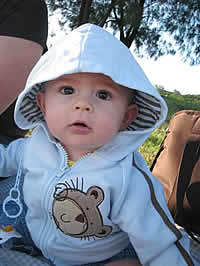 |
Most babies should be able to . . .
Some babies will probably be able to . . .
|
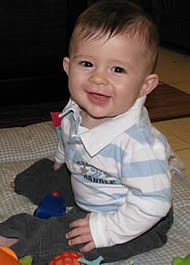 |
- Get upset if you take a toy away
- Play peek-a-boo
- Distinguish emotions by your tone of voice
- Pass object from one hand to the other
- Separation and stranger anxiety may begin
Some babies could possibly be able to . . .
- Stand while holding onto something
- Wave goodbye
- Clap hands
- Bang objects together
- Say mama or dada
- Pull up to standing position from sitting
- Walk holding onto furniture
8 MONTHS
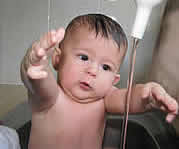 |
Most babies should be able to
- Start crawling
- Sit without support
- Pass object from one hand to the other
- Respond to own name
- Mouth and chew on objects
- Reach for spoon when being fed
|
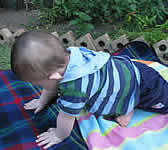 |
- Turn away when finished eating
- Say mama and dada to both parents (usually isn’t specific)
Some babies will probably be able to
- Stand while holding on to something
- Crawl well
- Pull up to standing position from sitting
- Walk holding onto furniture
- Clap and bang objects together
- Separation and stranger anxiety may begin
Some babies could possibly be able to
- Indicate wants with different gestures
- Use thumb and finger pincer grasp to pick things up
- Stand alone momentarily
- Wave goodbye
- Understand the word no, but that doesn't mean obedience!!!
9 TO 12 MONTHS
Baby sits well now and in this position plays happily for periods of time. Rolling and crawling means that baby could possibly get into trouble, and parents need start babyproofing the house, ensuring that electrical plugs are safely covered and all kitchen detergents and poisons are out of reach.
9 MONTHS
Most babies should be able to . .
- Stand while holding on to something
- Look for dropped objects
- Pull up to standing position from sitting
- Clap and bang objects together
- Combine syllables into word like sounds
- Separation and stranger anxiety may begin
|
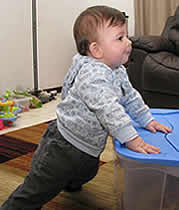 |
Some babies will probably be able to . . .
- Use thumb and finger pincer grasp to pick things up
- Walk holding onto furniture
- Stand alone momentarily
- Wave goodbye
- Drop object and then looks for them
- Understand the word no (but usually doesn’t obey it)
- Begin to identify self in a mirror
Some babies could possibly be able to . . .
- Say mama and dada to the right parents
- Play patty cake
- Play ball
- Drink from a cup independently
- Stand alone well
- Say one word other than mama or dada
10 MONTHS
Most babies should be able to . . .
-
Stand holding on to someone or something
-
Walk holding onto furniture
-
Pull up to standing position from sitting
-
Wave goodbye
-
Crawl well
-
Use thumb and finger pincer grasp to pick things up
Some babies will probably be able to . . .
-
Say mama and dada to the right parents
-
Understand the word no but doesn’t always obey it
-
Respond to own name
-
Indicate what he or she wants with gestures other than crying
-
Stand alone momentarily
Some babies could possibly be able to . . .
-
Drink from a cup independently
-
Stand alone well
-
Play ball and patty cake
-
Walk for a step or two
-
Say one word other than mama or dada
-
Put toys or object into a container
11 MONTHS
Most babies should be able to . . .
Some babies will probably be able to . . .
-
Say one word other than mama or dada
-
Drink from a cup independently
-
Indicate what he or she wants with gestures other than crying
-
Imitate others
-
Put toys or object into a container
Some babies could possibly be able to . . .
-
Stand alone well
-
Babble that sounds like her or she is talking a foreign language
-
Say two or more words other than mama or dada
-
Drink from a cup independently
-
Understand simple instructions
- Walk well
12 MONTHS
Most babies should be able to . . .
-
Imitate others sounds and activities
-
Babble different word like sounds
-
Indicate wants with gestures other than crying
-
Clap hands and bang objects together
-
Say one word other than mama or dada
-
Crawl well
-
Walk holding onto furniture well
-
Fearful of strangers
-
Pull off socks
|
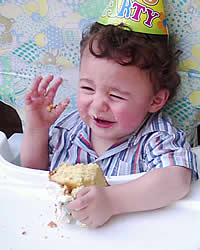
|
Some babies will probably be able to . . .
-
Say two or more words other than mama or dada
-
Take a few steps
-
Understand simple instructions
-
Test parents responses to certain behavior
-
Stand well
-
Walk with help
-
Shake head no
Some babies could possibly be able to . . .
-
Walk well
-
Scribble with markers or crayons
-
Say three or more words other than mama or dada
-
Respond to command without gestures
-
Babble that sounds like her or she is talking a foreign language
-
Drink from a cup independently
13 MONTHS
Most babies should be able to . . .
- Say two or more words other than mama or dada
- Stand well
- Bend over to pick up objects
- Take a few steps
- Walk with help
Some babies will probably be able to . . .
- Drink from a cup independently
- Say three or more words other than mama or dada
- Respond to command without gestures
- Scribble with markers or crayons
Some babies could possibly be able to . . .
- Try and lift heavier objects
- Roll a ball back and forth more actively
- Combine words and gestures to make his or her needs known
- Walk well
MONTH 14
Most babies should be able to . . .
- Stand well
- Take a few steps unassisted
- Walk with help
- Empty containers filled with objects
- Put objects back in container
- Say three or more words other than mama or dada
- Eat finger foods
|
 |
Some babies will probably be able to . . .
- Toddle well
- Point to a body part when asked
- Start game playing
- Combine words and gestures to make his or her needs known
Some babies could possibly be able to . . .
- Walk well
- Use a spoon or fork
- Match appropriate shapes into a developmental toy
- Push and pull toys while walking
MONTH 15
Most babies should be able to . . .
Some babies will probably be able to . . .
-
Walk well or runs
-
Draw lines
-
Say no and shakes head
-
Like to sing
-
Follow simple directions
Some babies could possibly be able to . . .
-
Walk up stairs
-
Want to help around the house
-
Remember caregiver and separation anxiety lessens
-
Respond to verbal requests without signals of any type
MONTH 16
Most toddlers should be able to . . .
-
Turn pages of a book when you read
-
Gets attached to stuffed animal or other object
-
Walk well
-
Sing and like to sing
-
Get upset when frustrated
Some toddlers will probably be able to . . .
Some toddlers could possibly be able to . . .
-
Become picky about certain foods
-
Take off an article of clothing without help
-
Separation anxiety lessens
-
Dance to music
-
Trot and prance around
MONTH 17
Most toddlers should be able to . . .
Some toddlers will probably be able to . . .
-
Say up to 10 or 15 words
-
Become picky about certain foods
-
Separation anxiety lessens
-
Run well
-
Uses certain words regularly
Some toddlers could possibly be able to . . .
MONTH 18
Most toddlers should be able to . . .
Some toddlers will probably be able to . . .
Some toddlers could possibly be able to . . .
-
Take apart toys and sometimes puts them back together
-
Show signs of potty training
-
Climb out of crib and high chair
-
Take off clothes
-
Draw circles
-
Understand two part directions
MONTH 19
Most toddlers should be able to . . .
Some toddlers will probably be able to . . .
Some toddlers could possibly be able to . . .
-
May show signs of bladder control
-
Brush teeth and washes hands without help
-
Draw better circles and straighter lines
-
Name several part of his or her body
MONTH 20
Most toddlers should be able to . . .
-
Take off clothes without help
-
Pretend to help toys and care for them such as feeding a doll
-
Know when something is wrong
-
Run well
Some toddlers will probably be able to . . .
-
Say 20 to 50 words
-
Start to learn words, possible 5 or more per day
-
Enjoy helping with things around the house
-
Start setting small goals
Some toddlers could possibly be able to . . .
-
Show better signs of bladder control
-
Walk up and possible down stairs with some assistance
-
Start to learn up to 10 new words per day
MONTH 21
Most toddlers should be able to . . .
-
Start to learn up to 5 or more words per day
-
Walk up stairs with some assistance
-
Make structures out of toys or blocks
Some toddlers will probably be able to . . .
Some toddlers could possibly be able to . . .
-
Name people and pets when shown a picture
-
Form short but complete and understandable sentences
-
Walk down stairs with a bit of help for balance
-
Open and close doors
MONTH 22
Most children should be able to . . .
-
Follow two step directions
-
Imitate others
-
Show good signs of bladder control
-
Start to learn up to 10 words or more per day
Some children will probably be able to . . .
-
Build simple puzzles
-
Identify several part of body
-
Walk down stairs with a bit of help for balance
-
Form short but complete and understandable sentences
-
Open and close doors
Some children could possibly be able to . . .
-
Put on and take off clothing alone
-
Start understanding opposites such as hot or cold, sweet and salty, more or less
-
Form three or four word sentences
-
Use up to 40 or more single words
MONTH 23
Most children should be able to . . .
-
Recognise and n ame pictures in books
-
Walk down stairs with some assistance
-
Identify their own body parts
-
Enjoy building simple puzzles
Some children will probably be able to . . .
-
Use up to 40 or more words
-
Form three or four word sentences
-
Put on and take off clothing alone
Some children could possibly be able to . . .
-
Walk down stairs unassisted
-
Want to talk about likes and dislikes
-
Start asking “why” to everything
-
Good portion of speech is understandable
MONTH 24
Most children should be able to . . .
-
Name at least 4 or more parts of the body
-
Half of their speech is understandable
-
Form three or four word sentences
-
Put on and take off clothing alone and choose own outfits - often inappropriate to weather conditions
Some children will probably be able to . . .
-
Walk down stairs all by themselves
-
Explain their likes and dislikes
-
Arrange things in different sections
-
Start asking “why” to everything
Some children could possibly be able to . . .
-
Start to understand the differences between boys and girls
-
Start to understand abstracts such as better or worse, sooner or later,
-
Like to sing, jump and play
2 TO 3 YEARS |
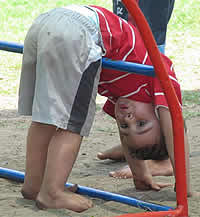 |
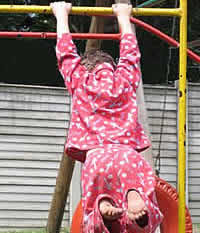 |
- Progress in throwing, jumping, climbing, stacking
- Follows 2 step commands
- Becoming more independent in dressing, brushing teeth, washing and drying hands
- Becomes more social and wants to start playing with others.
- Uses up to 50 single words
- Gets better at walking up and down stairs.
- Can put together sentences
- Begins to change word choice and tone of voice, depending on who he/she is talking to, such as another child, adult or parent
- Starts to ask more and more questions
- Wants to know why people act a certain way such as "Why is Mommy laughing"
- May start to create an imaginary play friend.
- Attention span improves
- Most toddlers show an increasing interest in using the potty.
- Will notice changes in routines.
- Becomes more interested in the opposites sex and what anatomy is different from boys and girls.
|
3 TO 4 YEARS
-
Uses more than 50 single words, with the vocabulary increasing at a rate that is hard to follow. Vocabulary will usually increase to several hundred words by age 4.
-
Uses longer sentences
-
Uses pronouns
-
Understand concepts such as less and more, small and big
-
Begins to understand cause and effect, such as, “If you break your toys you won't be able to play with them any more"
-
Most words and sentence are understood by others
-
Can describe how objects are used
-
Socializes with others well
-
Develops friendships independent of you, such as new friends at preschool
-
Socializes with other well
-
Enjoys playing with other children
-
Expresses a wide range of emotions
-
Uses a pedal tricycle
-
Likes pretend playing
-
May hold a pen, pencil or crayon the correct way
-
Likes to draw and paint simple shapes and model shapes with play dough
-
Alternate his or her feet when walking up and down the stairs
-
Walks backwards and sideways
-
Can balance on each foot for a second or two
-
Can carry and maneuver larger heavier objects and toys
-
Likes to climb obstacles and climbing frames
-
Like to dress and undress self
-
Uses a spoon and fork
-
Brushes his or her own teeth without help
-
May master toilet training
-
Uses an adult toilet without training seat
-
Boys start to stand at toilet instead of sit
-
May stay dry most nights
|

